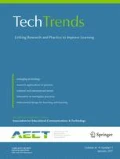Abstract
Computational thinking (CT) is considered an essential literacy skill for all children to develop, yet conceptual, practical, and empirical work with preschool-age children is scarce. A particular gap in the research is how CT instruction should be enacted (e.g., free play, guided play, levels of scaffolding, degree of child-initiated activities, and structure of programming tasks). Therefore, we aimed to describe what preschool children’s CT experiences are like when button-operated robots are introduced into their guided play. This interpretive phenomenological study applied the Mosaic Approach to explore the emergence of CT skills during guided play with a button-operated robot (Bee-Bot). Participants were 29 preschool-age children from an early childhood education center in the northeastern United States. Data sources included audio-visual recordings, observations, child focus groups, and child-generated artifacts. The findings suggest children constructed meaning across the CT dimensions, connected with others through dialogue and negotiation, and used guidance from adults to extend their learning.




Similar content being viewed by others
Notes
All classrooms and participants were assigned pseudonyms.
References
Ackermann, E. (2001). Piaget’s constructivism, Papert’s constructionism: What’s the difference ? Future of Learning Group Publication, 5(3), 438–448. 10.1.1.132.4253
Alqahtani, M. M., Hall, J. A., Leventhal, M., & Argila, A. N. (2022). Programming in mathematics classrooms: Changes in pre-service teachers’ intentions to integrate robots in teaching. Digital Experiences in Mathematics Education, 8, 70–98. https://doi.org/10.1007/s40751-021-00096-6
Angeli, C., & Valanides, N. (2020). Developing young children’s computational thinking with educational robotics: An interaction effect between gender and scaffolding strategy. Computers in Human Behavior, 105.https://doi.org/10.1016/j.chb.2019.03.018
Anwar, S., Bascou, N. A., Menekse, M., & Kardgar, A. (2019). A systematic review of studies on educational robotics. Journal of Pre-College Engineering Education Research, 9(2), 19–42. https://doi.org/10.7771/2157-9288.1223
Bers, M. U. (2018). Coding as a playground. Taylor & Francis.
Bers, M. U. (2019). Coding as another language: A pedagogical approach for teaching computer science in early childhood. Journal of Computers in Education, 6(4), 499–528. https://doi.org/10.1007/s40692-019-00147-3
Bers, M. U., González-González, C., & Armas-Torres, M. B. (2019). Coding as a playground: Promoting positive learning experiences in childhood classrooms. Computers & Education, 138, 130–145. https://doi.org/10.1016/J.COMPEDU.2019.04.013
Bers, M. U., Flannery, L., Kazakoff, E. R., & Sullivan, A. (2014). Computational thinking and tinkering: Exploration of an early childhood robotics curriculum. Computers and Education, 72, 145–157. https://doi.org/10.1016/j.compedu.2013.10.020
Brennan, K., & Resnick, M. (2012). New frameworks for studying and assessing the development of computational thinking. In Proceedings of the 2012 annual meeting of the American Educational Research Association, Vancouver, Canada (Vol. 1, p. 25).
Ching, Y. H., Hsu, Y. C., & Baldwin, S. (2018). Developing computational thinking with educational technologies for young learners. TechTrends, 62(6), 563–573. https://doi.org/10.1007/s11528-018-0292-7
Cilesiz, S. (2011). A phenomenological approach to experiences with technology: Current state, promise, and future directions for research. Educational Technology Research and Development, 59(4), 487–510.
Clark, A. (2005). Listening to and involving young children: A review of research and practice. Early Child Development and Care, 175(6), 489–505.
Clark, A., & Moss, P. (2011). Listening to young children: The Mosaic approach (2nd ed.). National Children’s Bureau.
Cortesi, S. C., Hasse, A., Lombana, A., Kim, S., & Gasser, U. (2020). Youth and digital citizenship+ (plus): Understanding skills for a digital world. SSRN Electronic Journal, 7641.https://doi.org/10.2139/ssrn.3557518
Fields, D., Vasudevan, V., & Kafai, Y. B. (2015). The programmers’ collective: Fostering participatory culture by making music videos in a high school Scratch coding workshop. Interactive Learning Environments, 23(5), 613–633. https://doi.org/10.1080/10494820.2015.1065892
Golinkoff, R. M., Hirsh-Pasek, K., & Singer, D. (2006). Play = learning: A challenge for parents and educators. In D. Singer, R. Golinkoff, & K. Hirsh-Pasek (Eds.), Play = learning: How play motivates and enhances children’s cognitive and social-emotional growth (pp. 1–20). Oxford University Press.
Hamilton, M., Clarke-Midura, J., Shumway, J. F., & Lee, V. R. (2020). An emerging technology report on computational toys in early childhood. Technology, Knowledge and Learning, 25(1), 213–224. https://doi.org/10.1007/s10758-019-09423-8
Han, M., Moore, N., Vukelich, C., & Buell, M. (2010). Does play make a difference? Effects of play intervention on at-risk preschoolers’ vocabulary learning. American Journal of Play, 3, 82–105.
Hunsaker, E. (2018). Computational thinking. In A. Ottenbreit-Leftwich & R. Kimmons (Eds.), The K-12 educational technology handbook. EdTech Books. https://edtechbooks.org/k12handbook/computational_thinking
International Society for Technology in Education. (2016). ISTE standards for students. International Society for Technology in Education. https://www.iste.org/standards/for-students
Jack, C., & Higgins, S. (2019). What is educational technology and how is it being used to support teaching and learning in the early years? International Journal of Early Years Education, 27(3), 222–237. https://doi.org/10.1080/09669760.2018.1504754
Jonassen, D., Campbell, J. P., & Davidson, M. E. (1994). Learning with media - Restructuring the debate. Educational Technology Research and Development, 42(2), 31–39. https://doi.org/10.1007/bf02299089
Jung, S. E., & Won, E. S. (2018). Systematic review of research trends in robotics education for young children. Sustainability, 10, 1–24. https://doi.org/10.3390/su10040905
Kanaki, K., & Kalogiannakis, M. (2018). Introducing fundamental object-oriented programming concepts in preschool education within the context of physical science courses. Education and Information Technologies, 23(6), 2673–2698. https://doi.org/10.1007/s10639-018-9736-0
Karagiorgi, Y., & Symeou, L. (2005). Translating constructivism into instructional design: Potential and limitations. Educational Technology and Society, 8(1), 17–27. https://doi.org/10.1002/tea.3660320904
Kimmons, R. (2018). Technology integration. In R. Kimmons & A. Ottenbreit-Leftwich (Eds.), The K-12 educational technology handbook (pp. 8–30). EdTech Books.
Lenters, K. (2013). Constructivism. In R. C. Richey (Ed.), Encyclopedia of terminology for educational communications and technology (pp. 63–64). Springer.
Logo Foundation. (2015). Logo history. Logo Foundation. https://el.media.mit.edu/logo-foundation/what_is_logo/history.html
Manches, A., & Plowman, L. (2017). Computing education in children’s early years: A call for debate. British Journal of Educational Technology, 48(1), 191–201. https://doi.org/10.1111/bjet.12355
Mazzoni, E., & Benvenuti, M. (2015). A robot-partner for preschool children learning English using socio-cognitive conflict. Educational Technology and Society, 18(4), 474–485. https://doi.org/10.1145/2696454.2696457
McCormick, K. I. (2018). Mosaic of care: Preschool children’s caring expressions and enactments. Journal of Early Childhood Research, 16(4), 378–392. https://doi.org/10.1177/1476718X18809388
McCormick, K. I., & Hall, J. A. (2021). Computational thinking learning experiences, outcomes, and research in preschool settings: A scoping review of literature. Education and Information Technologies. https://doi.org/10.1007/s10639-021-10765-z
Mehta, R., Henriksen, D., Mishra, P., & Deep-Play Research Group. (2020). “Let the children play!”: Connecting evolutionary psychology and creativity with Peter Gray. TechTrends, 64, 684–689.
Monteiro, A. F., Miranda-Pinto, M., & Osório, A. J. (2021). Coding as literacy in preschool: A case study. Education Sciences, 11(5). https://doi.org/10.3390/educsci11050198
Murcia, K. J., & Tang, K.-S. (2019). Exploring the multimodality of young children’s coding. Australian Educational Computing, 34(1), 1–15.
National Association for the Education of Young Children, & Fred Rogers Center for Early Learning and Children’s Media. (2012). Technology and interactive media as tools in early childhood programs serving children from birth through age 8 (pp. 1–15). http://www.naeyc.org/files/naeyc/PS_technology_WEB.pdf
National Association for the Education of Young Children. (2020). Developmentally appropriate practice: A position statement of the National Association for the Education of Young Children.
Newhouse, C. P., Cooper, M., & Cordery, Z. (2017). Programmable toys and free play in early childhood classrooms. Australian Educational Computing, 32(1). https://ro.ecu.edu.au/ecuworkspost2013/3494
Papadakis, S. (2021). The impact of coding apps to support young children in computational thinking and computational fluency A Literature Review. Frontiers in Education, 6(June), 1–12. https://doi.org/10.3389/feduc.2021.657895
Papadakis, Stamatios. (2020). Apps to promote computational thinking concepts and coding skills in children of preschool and pre-primary school age. In Stamatios Papadakis & M. Kalogiannakis (Eds.), Mobile learning applications in early childhood education (pp. 101–121). IGI Global.
Papert, S., & Harel, I. (1991). Situating constructionism. Constructionism, 1–11.https://doi.org/10.1111/1467-9752.00269
Parameswaran, U. D., Ozawa-Kirk, J. L., & Latendresse, G. (2020). To live (code) or to not: A new method for coding in qualitative research. Qualitative Social Work, 19(4), 630–644. https://doi.org/10.1177/1473325019840394
Piaget, J. (1954). The construction of reality in the child. Basic Books.
Plowman, L., & Stephen, C. (2003). A “benign addition”? Research on ICT and pre-school children. Journal of Computer Assisted Learning, 19(2), 149–164. https://doi.org/10.1046/j.0266-4909.2003.00016.x
Plowman, L., & Stephen, C. (2005). Children, play, and computers in pre-school education. British Journal of Educational Psychology, 36(2), 145–157.
Plowman, L., McPake, J., & Stephen, C. (2008). Just picking it up? Young children learning with technology at home. Cambridge Journal of Education, 38(3), 303–319. https://doi.org/10.1080/03057640802287564
Plowman, L., Stephen, C., & Mcpake, J. (2010). Supporting young children’s learning with technology at home and in preschool. Research Papers in Education, 25(1), 93–113.
Pyle, A., & Danniels, E. (2017). A continuum of play-based learning: The role of the teacher in play-based pedagogy and the fear of hijacking play. Early Education and Development, 28(3), 274–289. https://doi.org/10.1080/10409289.2016.1220771
Resnick, M. (2018). Lifelong kindergarten: Cultivating creativity through projects, passion, peers, and play. MIT Press.
Rich, P. J., & Hodges, C. B. (2017). Emerging research, practice, and policy on computational thinking (P. J. Rich & C. B. Hodges (eds.)). Springer. https://doi.org/10.1007/978-3-319-52691-1
Rich, P. J., Browning, S. F., Perkins, M. K., Shoop, T., Yoshikawa, E., & Belikov, O. M. (2019). Coding in K-8: International trends in teaching elementary/primary computing. TechTrends, 63(3), 311–329. https://doi.org/10.1007/s11528-018-0295-4
Saxena, A., Lo, C. K., Hew, K. F., & Wong, G. K. W. (2020). Designing unplugged and plugged activities to cultivate computational thinking: An exploratory study in early childhood education. Asia-Pacific Education Researcher, 29(1), 55–66. https://doi.org/10.1007/s40299-019-00478-w
Sheehan, K. J., Pila, S., Lauricella, A. R., & Wartella, E. A. (2019). Parent-child interaction and children’s learning from a coding application. Computers & Education, 140.
Stephen, C., & Plowman, L. (2013). Digital technologies, play and learning. Early Childhood Folio, 17(2), 3–8. https://doi.org/10.18296/ecf.0123
Sullivan, A., Kazakoff, E. R., & Umashi Bers, M. (2013). The wheels on the bot go round and round: Robotics curriculum in pre-kindergarten. Journal of Information Technology Education: Innovations in Practice, 12, 203–219. https://doi.org/10.28945/1887
van Manen, M. (2014). Phenomenology of practice: Meaning-giving methods in phenomenological research and writing. Left Coast Press.
Valentine, K. D., Kopcha, T. J., & Vagle, M. D. (2018). Phenomenological methodologies in the field of educational communications and technology. TechTrends, 62(5), 462–472. https://doi.org/10.1007/s11528-018-0317-2
Wang, X. C., Choi, Y., Benson, K., Eggleston, C., & Weber, D. (2021). Teacher’s role in fostering preschoolers’ computational thinking: An exploratory case study. Early Education and Development, 32(1), 26–48.
Weisberg, D. S., Hirsh-Pasek, K., & Golinkoff, R. M. (2013). Guided play: Where curricular goals meet a playful pedagogy. Mind, Brain, and Education, 7, 104–112.
Weisberg, D. S., Hirsh-Pasek, K., Golinkoff, R. M., Kittredge, A. K., & Klahr, D. (2016). Guided play: Principles and practices. Current Directions in Psychological Science, 25(3), 177–182.
Wood, E., Nuttall, J., Edwards, S., & Grieshaber, S. (2020). Young children’s digital play in early childhood settings: Curriculum, pedagogy and teachers’ knowledge. In O. Erstad, R. Flewitt, B. Kümmerling-Meibauer, & I. Pereira (Eds.), Routledge handbook of digital literacies in early childhood (pp. 214–226). Routledge.
Yu, J., & Roque, R. (2019). A review of computational toys and kits for young children. International Journal of Child-Computer Interaction, 21, 17–36. https://doi.org/10.1016/j.ijcci.2019.04.001
Acknowledgements
The authors gratefully acknowledge Kelsi Carlisle, Tara Grospin, Natasha McCarthy, and Maya Waters (undergraduate research assistants) for helping document and facilitate the guided play experiences and Molly Blinn (graduate assistant) for assisting with the invitations to play. Without their hard work and dedication, this research would not have been realized.
Funding
Partial financial support was received from the SUNY Cortland Research and Sponsored Programs Office.
Author information
Authors and Affiliations
Corresponding author
Ethics declarations
The authors have no relevant financial or non-financial interests to disclose.
Ethics Approval
The SUNY Cortland Institutional Review Board reviewed and granted full board approval for this research (May 2, 2019/IRB Protocol Number: 181930). The procedures used in this study adhere to the tenets of the Declaration of Helsinki.
Informed Consent
The authors obtained informed consent from legal guardians for all individual participants included in the study. Parents signed informed consent forms regarding publishing their children’s data and photographs.
Additional information
Publisher's Note
Springer Nature remains neutral with regard to jurisdictional claims in published maps and institutional affiliations.
Rights and permissions
About this article
Cite this article
Hall, J.A., McCormick, K.I. “My Cars don’t Drive Themselves”: Preschoolers’ Guided Play Experiences with Button-Operated Robots. TechTrends 66, 510–526 (2022). https://doi.org/10.1007/s11528-022-00727-8
Accepted:
Published:
Issue Date:
DOI: https://doi.org/10.1007/s11528-022-00727-8




